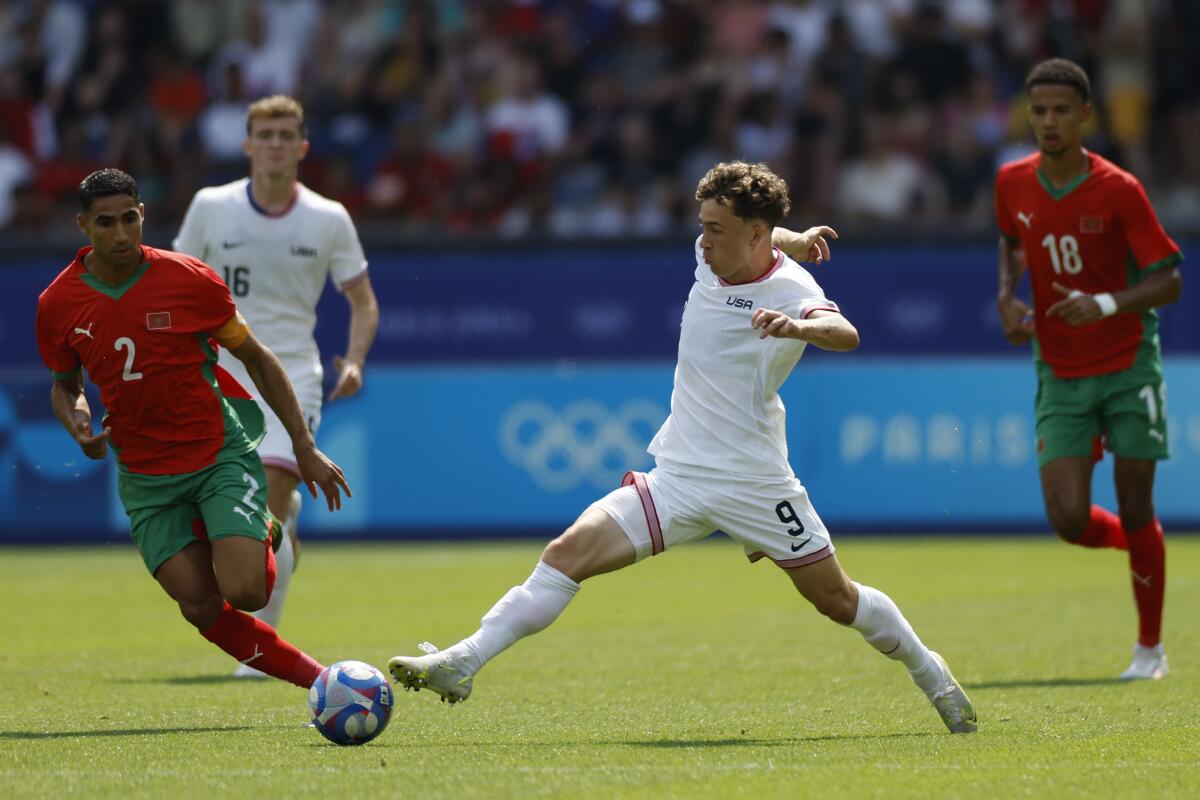PARIS — You can make an argument the U.S. men’s team turned in a great performance in the Paris Olympics soccer tournament, playing four games in 10 days, winning two of them by a combined score of 7-1 and losing only to France and Morocco, countries that made the semifinals of the last World Cup.
You can also make an argument the U.S. men’s turned in a dismal performance, winning against international minnows New Zealand and Guinea and losing twice by a combined score of 7-0 in games that were really not competitive.
But whichever one of those arguments you make, what remains inarguable is the fact that this tournament represents progress for the national team program.
The U.S. won two matches in the Olympics for the first time, it played in the quarterfinals for just the second time since 1956 and it competed in front of hostile, sellout crowds in massive stadiums.
“Hopefully people saw the bright spots from this group,” defender Walker Zimmerman said. “Guys showed they can perform on the international stage and showed that they have a bright future ahead of them. I think the takeaway is that there are a lot of players on this team that can hopefully progress their club careers, progress their national team careers, and hopefully got a taste of what it looks like to play and the biggest tournament in the world.”
When the U.S. has qualified for the Olympics, which hasn’t been often, it’s proved an important stepping stone toward the senior national team and World Cup. Sixteen of the 18 players on the last U.S. team to play in the Summer Games in 2008 went on to play for the full national team; six were on the World Cup roster two years later. The last Olympic team to play in the quarterfinals, in 2000, also sent six players to the next World Cup, where the U.S. advanced to the final eight for the only time in the modern era.
“The Olympic Games are probably the biggest event that humanity created. And once you’re in the Olympic Games, you’re in a big spotlight,” coach Marko Mitrović said. “Before this tournament it was an uncertainty for them. What is playing in a tournament like this [like]?
“Now, after this, I feel that they’re going to be much more ready for what is coming.”

Morocco’s Achraf Hakimi, left, challenges U.S. Griffin Yow during an Olympic quarterfinal match on Friday.
(Aurelien Morissard / Associated Press)
On the men’s side the Olympics are an age-group tournament limited, with three exceptions, to players born on or after Jan. 1, 2001. But the U.S. didn’t send its best age-eligible players to France. Some targeted by Mitrović for callups weren’t released by their club teams while eight others — defenders Joe Scally and Kristoffer Lund; midfielders Yunus Musah, Gio Reyna, Johnny Cardoso and Malik Tillman; and forward Ricardo Pepi and Folarin Balogun — all played in this summer’s Copa América rather than the Olympics.
But if that’s a bad thing, here’s the good: 26 young players in the pool for the 2026 World Cup team participated in major international tournaments this summer. Compare that to the 2022 World Cup team which has just one player, defender DeAndre Yedlin, with World Cup or Olympic experience.
For many of the others on the team in Qatar, the world stage and spotlight were overwhelming.
“It’s definitely different,” said Zimmerman, the only World Cup veteran on the Olympic team. “You feel that intensity, you feel that excitement and you feel that honor, all heightened to another level. You know that more eyes are on your team, on you.
“You know what it means if you are successful as an individual, as a collective, and so there’s just more at stake.”
There’s at lot at stake over the next two years for U.S. Soccer as a whole too. With the World Cup returning to North America in 2026, the federation has a once-in-a-generation shot at raising the sport’s profile in the U.S., banking sponsors and winning over new fans. That’s why the federation was quick to pull the plug on coach Gregg Berhalter after his team’s poor Copa América.
The only other time the tournament was played in the U.S., it gave birth to MLS, greatly altering the trajectory of the sport in the U.S. and Canada. To have a chance at a similar impact, the U.S. needs to make a run to the quarterfinals at least.
And there can be no argument that this Olympic tournament has expanded the pool of players seasoned and experienced in international competition that the team will need to make that happen.
⚽ You have read the latest installment of On Soccer with Kevin Baxter. The weekly column takes you behind the scenes and shines a spotlight on unique stories. Listen to Baxter on this week’s episode of the “Corner of the Galaxy” podcast.
